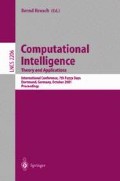Abstract
In the field of modeling, fuzzy models are one efficient approach for representing technical systems or human control strategies. Fuzzy models have the advantage of supplying a transparent and interpretable model. Conventional fuzzy models are based on fuzzification, inference and defuzzification. The fuzzification and inference operations are theoretically well-established in the framework of fuzzy logic. In contrast, conventional defuzzification methods are essentially empirically motivated. First, we recapitulate the inference filter concept, which supplies a new understanding of the defuzzification process and a theoretical framework. Second, we extend this approach to the advanced inference filter concept, which leads to a defuzzification method that is better suited to imitate the behavior of a human expert.
Access this chapter
Tax calculation will be finalised at checkout
Purchases are for personal use only
Preview
Unable to display preview. Download preview PDF.
References
D. Driankov, H. Hellendoorn, and M. Reinfrank. An Introduction to Fuzzy Control. Springer, Berlin Heidelberg, 1993.
H. Kiendl. The inference filter. In Second European Congress on Intelligent Techniques and Soft Computing (EUFIT’ 94), volume 1, pages 443–452, Aachen, 1994. Verlag Mainz.
H. Kiendl. Verfahren zur Defuzzifizierung für signalverarbeitende Fuzzy-Baueinheiten und Filtereinrichtungen hierfür. Kiendl, 1995. Patent DE 44 16 465.
H. Kiendl. Fuzzy-Control methodenorientiert. Oldenbourg Verlag, München, 1997.
H. Kiendl. Non-translation-invariant defuzzification. In Proceedings of the Sixth IEEE International Conference on Fuzzy Systems (FUZZ-IEEE’ 97), Barcelona, Spanien, 1997, pages 737–742, Piscataway, NJ, 1997. IEEE Press.
H. Kiendl, R. Knicker, and F. Niewels. Two way fuzzy controllers based on hyperinference and inference filter. In Proceedings of World Automation Congress (WAC’ 96), Montpellier, Frankreich, 1996. TSI Enterprise Inc.
H. Kiendl and P. Krause. Implicit modeling to cope with ambigous data. In Proceedings of the IASTED International Conference Modeling, Identification and Control (MIC 2001), Innsbruck, Österreich, volume 1, pages 291–296, 2001.
A. Krone. Datenbasierte Generierung von relevanten Fuzzy-Regeln zur Modellierung von Prozesszusammenhängen und Bedienstrategien. Fortschritt-Berichte VDI, Reihe 10, Nr. 615. VDI Verlag, Düsseldorf, 1999.
M. Mackey and L. Glass. Oscillation and Chaos in Physiological Control Systems. Science, 197:287–289, 1977.
F. Niewels. Analytische formeln für das inferenzfilter zur berechnung gefilterter zugehöorigkeitsfunktionen. pages 1–14. Forschungsbericht der Fakultät für Elektrotechnik, Nr. 0896, Universität Dortmund, 1996.
J. Praczyk. Entwurf von Fuzzy-Gütemaßen zur Prozeßbewertung. Fortschritt-Berichte VDI, Reihe 8, Nr. 796. VDI Verlag, Düsseldorf, 1999.
G. Reil and H. Jessen. Fuzzy contour modelling of roll bent components using inference filter. In Proceedings of the Third European Congress on Intelligent Techniques and Soft Computing (EUFIT’ 95), pages 771–774, Aachen, 1995. Verlag Mainz.
T. Slawinski, A. Krone, P. Krause, and H. Kiendl. The fuzzy-rosa method: A statistically motivated fuzzy approach for data-based generation of small interpretable rule bases in high-dimensional search spaces. In M. Last, A. Kandel, and H. Bunke, editors, Data Mining and Computational Intelligence, pages 141–166. Physica-Verlag Heidelberg, 2001.
Author information
Authors and Affiliations
Editor information
Editors and Affiliations
Rights and permissions
Copyright information
© 2001 Springer-Verlag Berlin Heidelberg
About this paper
Cite this paper
Kiendl, H., Krause, P. (2001). Advanced Inference Filter Defuzzification. In: Reusch, B. (eds) Computational Intelligence. Theory and Applications. Fuzzy Days 2001. Lecture Notes in Computer Science, vol 2206. Springer, Berlin, Heidelberg. https://doi.org/10.1007/3-540-45493-4_29
Download citation
DOI: https://doi.org/10.1007/3-540-45493-4_29
Published:
Publisher Name: Springer, Berlin, Heidelberg
Print ISBN: 978-3-540-42732-2
Online ISBN: 978-3-540-45493-9
eBook Packages: Springer Book Archive

